
SEO For Manufacturers: How To Get Found Online By The Right Buyers
The manufacturing industry in the U.S. is massive and crowded, with over 605,548 manufacturing businesses operating nationwide. This makes standing out online very hard.
Most buyers aren’t flipping through directories or calling around for quotes anymore. 94% of B2B buyers in manufacturing do research online before making any purchase decisions, and 70%
of industrial professionals compare suppliers online, too.
So, if your company isn’t showing up, someone else will.
A strong search engine optimization (SEO) strategy helps manufacturing companies solve one of their biggest problems: getting found by the right buyers at the right time.
It’s not just about rankings. It’s about visibility, authority, and creating a steady stream of qualified leads through your website.
In this guide, we’ll explain how you can use SEO to stand out in a competitive industry and attract more business online.
What Is SEO for Manufacturing Companies?
SEO for manufacturers is all about helping your ideal customers find your business through Google and other search engines.
It’s a super important part of any digital marketing strategy, especially for manufacturing companies that want to grow their online presence and generate consistent leads.
The core idea behind SEO is to improve your rankings in search results so that potential buyers, distributors, or sourcing managers find your website before they find somebody else.
And the higher you rank, the more website traffic you’re likely to get from people actively searching for what you offer, whether that’s precision parts, packing machinery, or CNC services.
Understanding SEO Strategy for Manufacturers
Organic traffic generates more leads for manufacturing companies, making up 69% of their lead sources. And how do you get this organic traffic? Good SEO.
A strong SEO strategy for manufacturers goes beyond including a few keywords on your homepage.
It’s about making sure your site is technically sound, creating helpful content for your target audience, and building high-quality backlinks that show search engines that you’re a trusted source in the manufacturing industry.
For manufacturers, this often means tailoring your SEO approach to suit a B2B buying process. This is a longer, more research-driven sales cycle that is built around trust.
SEO helps you get in front of decision-makers early, stay visible during their evaluation phase, and ultimately drive more qualified leads to your manufacturing website.
This manufacturer’s website may have been SEO optimized because it shows up first in the search results when we type in “CNC manufacturer”:

How Experience, Expertise, Authoritativeness, and Trustworthiness (E-E-A-T) contribute to manufacturer SEO
Google wants to show users websites they can trust. While Experience, Expertise, Authoritativeness, and Trustworthiness (E-E-A-T) isn’t a direct ranking factor, it has a huge influence on how Google evaluates the quality of your content and your website.
This is what E-E-A-T looks like in practice:
Experience: Highlight your real-world knowledge. This could be in the form of case studies, behind-the-scenes insights, or project breakdowns showing how you’ve helped past clients.
Expertise: Publish content that shows a deep knowledge of your products, processes, and industry. Think technical guides, certifications, or white papers written by engineers or product specialists.
Authoritativeness: You need to show you’re respected in your field. Getting mentioned on industry sites, partnering with known brands, and earning quality links all help with your authority.
Trustworthiness: Make sure your website is secure and feels legitimate. This includes having an SSL certificate, easy-to-find contact details, clear policies, and up-to-date company information.
This manufacturer publishes detailed case studies of how it's helped its clients achieve real-world results, potentially signalling strong E-E-A-T to Google:
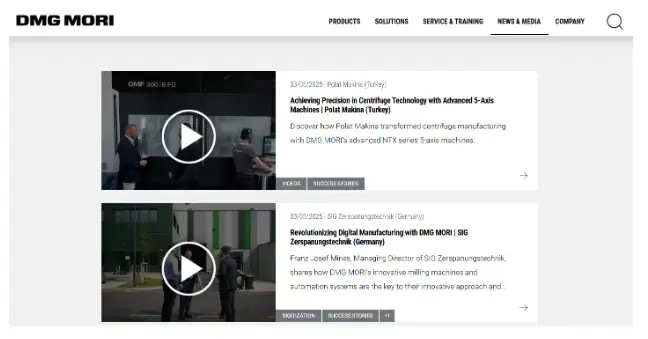
5 Strategies for Manufacturing SEO That Google Will Love
Now that you know more about SEO for manufacturers, let’s take a look at some super powerful search engine optimization strategies you can use to rank well and get ahead of your competitors:
1. Off-page SEO: Linkbuilding
Around 58% of businesses say that link building has a massive impact on their search rankings.
What are backlinks?
Backlinks are links from other websites that point to yours. Google considers these as votes of confidence.
The more high-quality, relevant sites that link to your content, the more likely it is that search engines will trust your site and rank you higher in search results.
Why is linkbuilding important for manufacturing companies?
Linkbuilding is the process of acquiring backlinks from other sites that point to yours.
For manufacturers, linkbuilding is a smart way to stand out in a competitive B2B space, build authority in your niche, and drive referral traffic from sites your potential customers already visit.
It’s also important because it helps you build a better backlink profile and rank higher in search results.
Nearly 70% of manufacturing companies are actively doing link building as part of their SEO efforts, meaning there’s loads of competition. If you haven’t started building links yet, there’s never been a more important time to begin!
The best linkbuilding tactics for manufacturers
Now that you know more about backlinks, let’s look at some of the best strategies we recommend securing links to your website:
Get listed on industry directories
This is one of the easiest wins in manufacturing SEO. There are plenty of reputable directories built specifically for B2B buyers, engineers, and procurement teams. We’ll list these later in this article.
Not only do directory listings help with website traffic, but they also help you earn relevant backlinks from trusted sources in your niche.
Publish technical and educational content
Creating helpful, in-depth resources like guides, datasheets, or industry explainers can naturally attract backlinks. These are also known as linkable assets.
Think about what your target audience is searching for, and build content around those topics.
If your content genuinely helps people solve problems or make better decisions, other websites will be more likely to link to it over time.
This manufacturing company has posted a linkable asset about injection molding. It’s so well-crafted that it has earned 47 high-quality backlinks:
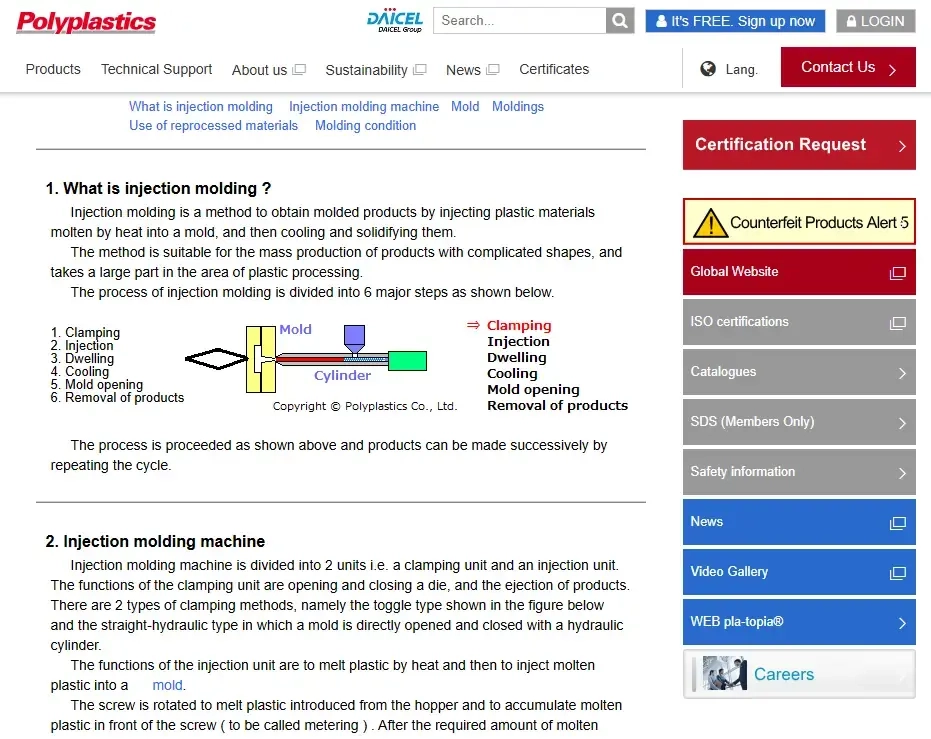
Reach out to trade publications
Many manufacturer trade sites are actively looking for expert contributors, case studies, or product announcements.
Pitch a guest article, share your expertise, or offer insights into your manufacturing process.
If it gets published, you’ll usually get a backlink to your site and build credibility at the same time.
Partner with suppliers and distributors
Chances are, you work with other companies that already have websites with some authority. See if they’d be open to linking to your site, which they could do through a supplier page or partner spotlight.
Sponsor local or industry events
If you sponsor a trade event, conference, or a local technical college, you’ll often get a backlink from the event or organization’s website.
Create a press page and share company news
If you’re investing in new equipment, expanding your facility, or launching a new product, don’t keep it to yourself.
Create a press or news section on your site, and send updates to relevant publications or local media. Even a small mention in a regional business journal can earn you a quality backlink.
Below, you can see that this manufacturing business regularly publishes company news and product announcements on its website, potentially helping it attract more backlinks:
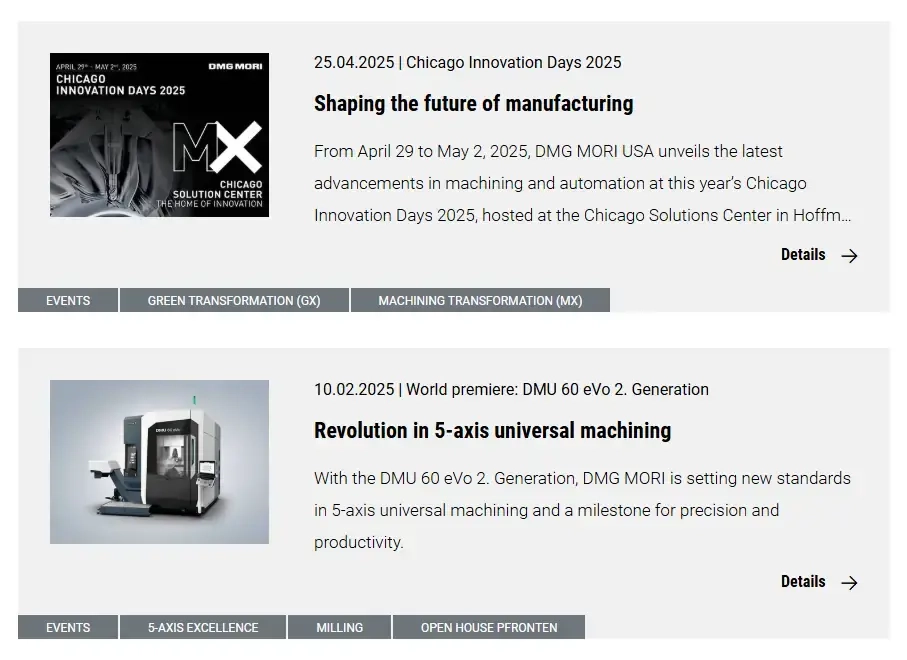
An example of backlinks for manufacturing businesses
Metoree allows you to search for manufacturers and suppliers with over 8,000 categories and 100,000 companies. It has compiled a list of the best coil spring manufacturers in 2025, and each business receives a relevant, niche-specific backlink to its website:
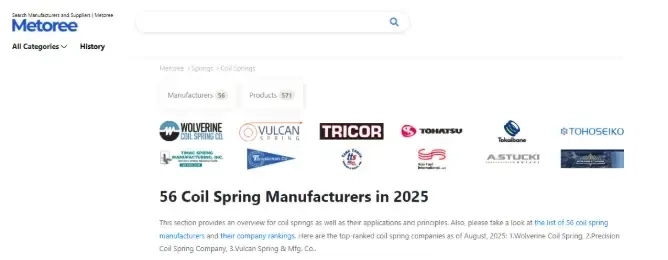
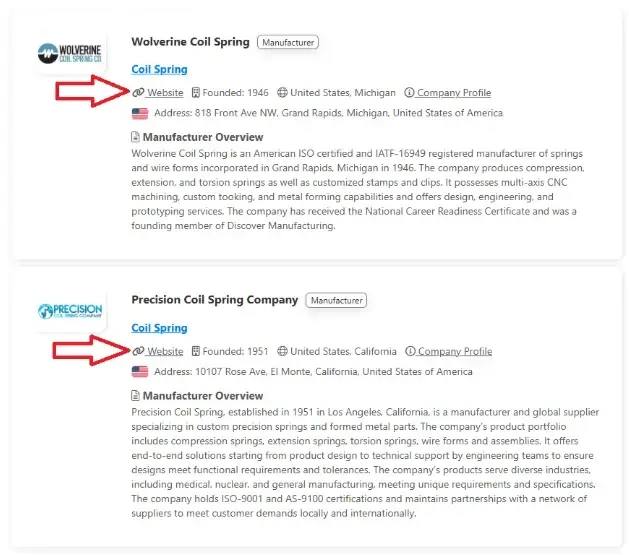
2. Keyword research
Keyword research is the process of figuring out what your ideal customers are typing into Google when they’re looking for the products or services you offer.
It’s a core part of any SEO strategy because it makes sure you’re targeting the right search terms: ones that bring in relevant, qualified traffic.
If you get keyword research right, you’ll attract the right visitors at the right stage of the buying process.
The types of keywords manufacturers should target
Below are some of the types of keywords manufacturing businesses should aim to target based on where their potential customers are in the buying process:
Top-of-funnel keywords (awareness stage)
These are slightly more general, informational keywords. The person searching might not be ready to buy, but they’re researching and gathering information.
These keywords are great for blog posts, guides, and educational resources. They help bring potential buyers into your ecosystem early.
Some examples include “How plastic injection molding works”, “Types of packaging machinery”, and “Metal stamping vs. die casting”.
Middle-of-funnel keywords (consideration stage)
Middle-of-funnel keywords show a bit more search intent. The searcher knows what they need, but they’re still weighing up options or learning more about suppliers.
Target these with detailed service pages, comparison content, or industry-specific landing pages.
Examples of middle-of-funnel manufacturing keywords include “Best sheet metal fabrication companies”, “Automated assembly systems for electronics”, and “Custom CNC parts for aerospace”.
Bottom-of-funnel keywords (decision stage)
These keywords are used by people who are ready to take action, like requesting a quote, placing an order, or contacting you.
They are high-value keywords and should be the focus of your key product or service pages.
Some examples of these types of keywords for manufacturing could be “Custom gearbox manufacturer near me”, “ISO certified injection molding company”, or “RFQ for aluminum die casting”.
3. On-page SEO
On-page SEO is all about optimizing the content and structure of your website to help search engines understand what your pages are about and make it easier for potential customers to find what they’re looking for.
You want Google to know exactly what you offer, and you want your content to speak directly to engineers, buyers, and procurement managers.
Let’s break down three key on-page SEO tasks to focus on:
Title tags and meta descriptions
Your title tag is the clickable headline that appears in search results. It’s one of the first things people see, and it helps search engines understand the topic of your page.
Title tags: These should be clear and concise, at around 60 characters or less to avoid being cut off in search results. They should include your main keyword and be written for humans, not just search engines.
Meta descriptions: These don’t directly affect rankings, but they do influence how many people click on your search result. Meta descriptions should be 155 characters or less, highlight what the page is about, and include a call to action (CTA).
This manufacturing website has a keyword-rich title tag and a detailed meta description that highlights the fact that buyers will get expert assistance:

Dedicated service or product pages
It’s best not to lump all your services or product lines onto one page. If you want to rank for specific keywords and attract the right traffic, you need individual pages for each product or service you offer.
Each page should include:
A clear, keyword-optimized H1 heading.
Descriptive copy (not just bullet points).
Internal links to related services or resources.
Contact or quote CTAs to convert visitors.
This manufacturer has dedicated landing pages for each of its products with detailed information, optimized content, and clear CTAs:
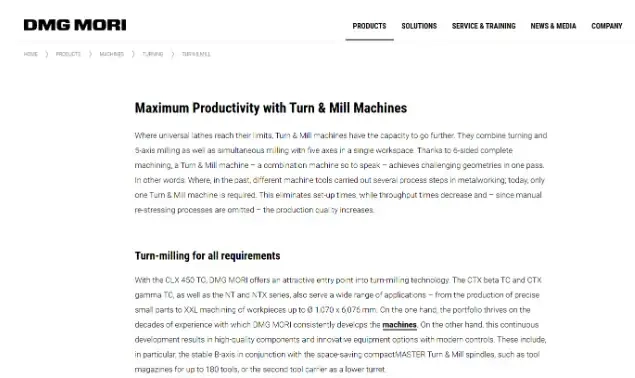
Image SEO
Images are important not just for design but also for SEO. Google can’t interpret images unless you optimize them.
Here are two ways to get image SEO right:
Use descriptive file names: Before uploading an image, rename it to something descriptive and relevant. Instead of “IMG_2837.jpg”, you could try “cnc-machined-aluminum-part.jpg”.
Use alt text: This tells search engines what your image is about and improves accessibility for visually impaired users using screen readers. Instead of “image123”, your alt text could be “Close-up of CNC-machined aluminum automotive part”.
4. Technical SEO
Technical SEO is about optimizing the elements of your website that users don’t see. These elements make it easier for search engines to understand and rank your pages properly.
This part of search engine optimization can be tricky, so you might want to hire a manufacturing SEO company to help you get it right.
But there are three technical SEO tasks you can try to tackle yourself, including:
Site speed
Page load time plays a big role in both SEO and user experience. If your website takes more than three seconds to load, 53% of mobile visitors will leave (and Google notices this).
To improve your site speed:
Compress large images without losing quality.
Minimize unnecessary scripts and plugins.
Use fast, reliable hosting.
Enable browser caching and file compression.
Mobile-friendliness
Google uses mobile-first indexing, which means it prioritizes the mobile version of your website when ranking your pages. Around 96.3% of users access the web on mobile devices, so your site needs to perform well on these.
Also, mobile optimization seriously improves business outcomes for 59% of manufacturing marketers.
Make sure your website:
Uses responsive design that adapts to different screen sizes.
Has buttons and text that are easy to tap and read.
Functions properly on all types of mobile devices.
Schema markup
Schema markup is a type of code that you can add to your website that helps search engines understand your content.
It can also make your listings in search results look better by adding rich snippets like star ratings, FAQs, or product details.
Pages with schema markup see way higher click-through rates (CTRs), with some studies showing up to a 40% higher CTR compared to pages without schema.
There is a chance that this manufacturing website is using schema markup, as they have a rich search result:
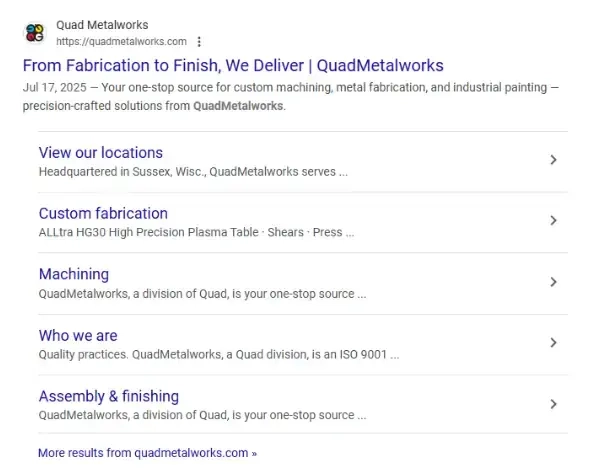
5. Local SEO
Local SEO helps your manufacturing business show up when nearby customers or partners are searching for your products or services.
You could be targeting procurement teams in your region or trying to win more local contracts. Either way, local SEO makes sure you’re visible in search results for businesses nearby to the searcher.
For example, when someone types in “precision machining near me” or “[your service] in [city],” Google will prioritize businesses that are geographically relevant and have strong local signals.
Here are two ways you can improve your local SEO:
Get listed in the right directories
Being listed in trusted online directories helps Google validate your business. It also makes it easier for customers to find and contact you.
Over 55% of manufacturers see measurable return on investment (ROI) from directory listings as part of their local SEO efforts.
Start by adding your business to platforms like Thomasnet, Yelp, Yellow Pages, and industry-specific directories related to your niche.
Make sure your business name, address, and phone number (NAP) are consistent across all your directory listings. Having this consistency helps build trust with both search engines and potential buyers.
In the example below, this manufacturing company has listed its services on Thomasnet with complete business details, potentially helping them rank higher in local search results:
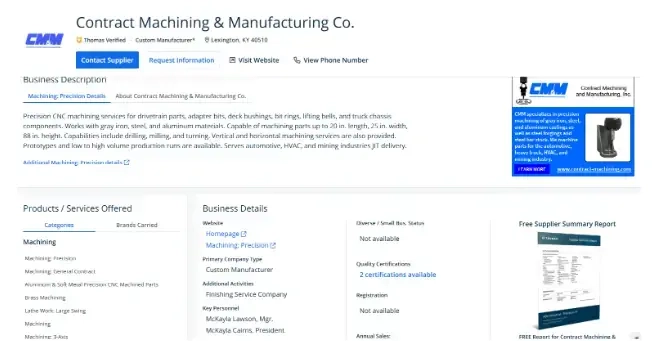
Claim and optimize your Google Business Profile (GBP)
Your Google Business Profile (GBP) is a super important asset for local SEO. If you haven’t already claimed and verified yours, that should be your next move.
Once you’ve claimed your GBP, you need to optimize it. Here’s how:
Use your exact business name (no extra keywords!).
Add up-to-date contact information and business hours.
Choose accurate categories for your services.
Upload high-quality images of your facility, products, or team.
Encourage happy clients to leave reviews (and respond to them when they do).
This spring manufacturing company has a complete and up-to-date GBP with great photos that is attracting positive reviews:
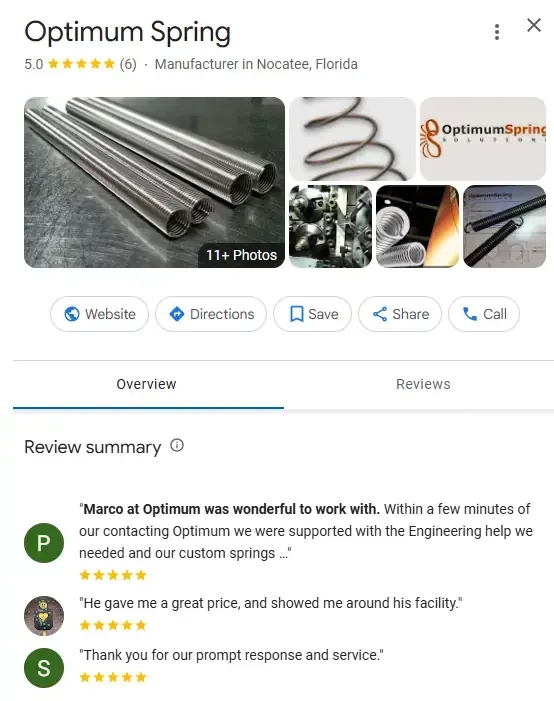
Secure Authoritative Backlinks with an Agency You Can Trust
SEO for manufacturers isn’t just about ticking boxes. It’s about building long-term online visibility in a competitive industry.
With the right mix of technical fixes, keyword targeting, and smart linkbuilding, you can turn your manufacturing website into a lead generation machine.
At LinkBuilder, we focus on helping businesses like yours earn backlinks that make an impact. Our team finds high-quality, relevant opportunities that improve your rankings and build real authority in your industry.
Get in touch today, and let’s help your site get found by the right buyers through backlinks that work.

